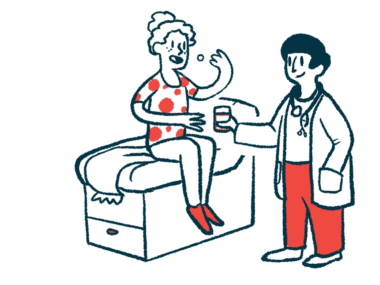Long-term benefits seen with Descartes-08 treatment in MG
New Phase 2 trial data show reduced symptom severity for patients
Written by |

Treatment with the cell therapy Descartes-08 led to long-term reductions in symptom severity for people with myasthenia gravis (MG) taking part in a Phase 2b clinical trial, according to updated data announced by therapy developer Cartesian Therapeutics.
“Participants dosed with a single six-week course of treatment of Descartes-08 were observed to continue to experience a sustained benefit in symptoms of MG at the 12-month assessment,” Cartesian reported in a company press release.
In fact, more than 80% of the evaluable patients “maintained a clinically meaningful response,” per the release.
Tuan Vu, MD, a trial investigator from the University of South Florida Morsani College of Medicine, said these data “[highlight] the potential of Descartes-08 to serve as an important therapeutic option to deliver deep and sustained reductions in MG-ADL for patients with myasthenia gravis.”
Vu shared the new findings in an oral presentation at the 2025 American Academy of Neurology Annual Meeting, held April 5-9 in San Diego and virtually. The presentation was titled “Efficacy and Safety of Autologous BCMA-directed mRNA CAR T-Cell Therapy in Generalized Myasthenia Gravis: Results from a Phase 2b Randomized Placebo-controlled Trial.”
New data consistent with previously reported trial findings
MG is an autoimmune disease in which antibodies interfere with normal communication between nerve and muscle cells, resulting in symptoms of muscle weakness and fatigue. Antibodies are specialized proteins made by B-cells, a type of immune cells.
Descartes-08 is a CAR T-cell therapy designed to deplete, or lower, the number of B-cells. In this type of treatment, another type of immune cells called T-cells are collected from a patient, then engineered with a specialized receptor that directs them to attack cells containing B-cell maturation antigen (BCMA), a protein found on the surface of B-cells. The modified T-cells are then infused back into the patient.
Unlike other CAR T-cell therapies, Descartes-08 can be infused without the need for hospitalization or chemotherapy prior to the infusion.
Cartesian is sponsoring a Phase 2b clinical trial, called MG-001 (NCT04146051), that’s testing Descartes-08 in people with generalized MG. The new data covered findings from 12 patients, all of whom received six weekly infusions of Descartes-08 at the start of the study, and were then followed for one year.
Consistent with previously reported findings, these new data indicate that Descartes-08 led to reductions in disease severity as measured using two standardized scales: the MG Activities of Daily Living, known as MG-ADL, and the Quantitative MG, called QMG.
After four months of treatment with Descartes-08, average MG-ADL scores had dropped — indicating an improvement — by 5.5 points. By the end of a year of follow-up, average MG-ADL scores were still 4.8 points better than they had been before treatment. In 10 of the 12 patients, MG-ADL scores had improved by at least two points through a year of follow-up.
The impressive strength and duration of response shown in the data reinforce our confidence in the potential of Descartes-08 to transform the current treatment landscape in MG, offering patients a safe, flexible, and durable treatment option.
Four of the 12 patients met the criteria for minimal symptom expression, or MSE, defined as having an MG-ADL score of 0 or 1, at the six-month mark that was sustained for one year. QMG scores also improved, by an average of 4.8 points after four months, and by six points after one year.
Calling the new results “remarkable,” Carsten Brunn, PhD, president and CEO of Cartesian, said the data “underscore the potential of utilizing our cell therapy to deliver deep and durable responses in MG patients.”
Brunn noted that the treatment was done in an outpatient setting with no preconditioning chemotherapy.
“The impressive strength and duration of response shown in the data reinforce our confidence in the potential of Descartes-08 to transform the current treatment landscape in MG, offering patients a safe, flexible, and durable treatment option,” Brunn said.
Long-term treatment shows particular benefit in treatment-naive patients
The company noted that seven of the 12 study participants had not previously been treated with biological MG therapies. Such treatments include complement inhibitors (e.g. Soliris, Ultomiris, Zilbrysq) and FcRn blockers (e.g. Vyvgart, Vyvgart Hytrulo, Rystiggo).
In these patients, the effects of Descartes-08 were particularly strong. At one year following treatment, average MG-ADL scores had improved by 7.1 points, and average QMG scores had improved by 9.4 points.
All of these patients experienced an improvement of at least two points on their MG-ADL scores. Moreover, all four of the patients who achieved MSE after six months and maintained it through to one year had not been previously treated with biological therapies.
“The data in participants who had not received prior biologic therapy is particularly striking as this population is most comparable to the patient populations in trials of standard-of-care biologics,” Vu said.
According to Cartesian, Descartes-08 was generally well tolerated in the study. The most common side effects related to the therapy were infusion reactions, such as fever, chills, headache, and nausea. These typically resolved within a day of each infusion. Importantly, per the researchers, no treatment-related safety issues were reported after month four. There also were no reported cases of certain types of severe immune responses, such as cytokine release syndrome, usually seen with conventional CAR T-cell therapies.
Cartesian is now gearing up for a Phase 3 trial that will test Descartes-08 in adults who are positive for antibodies against acetylcholine receptor (AChR), the most common type of MG-causing antibody. The Phase 3 study, dubbed AURORA (NCT06799247), is expected to start dosing patients by the end of June, Brunn noted.
“We look forward to dosing the first patient in our Phase 3 AURORA trial,” Brunn said.





Leave a comment
Fill in the required fields to post. Your email address will not be published.